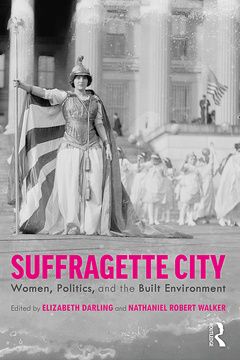Suffragette City Women, Politics, and the Built Environment
Coordonnateurs : Darling Elizabeth, Walker Nathaniel

SHORTLISTED FOR THE COLVIN PRIZE 2021! Awarded by the Society of Architectural Historians of Great Britain, the Colvin Prize is one of the world's most prestigious honors in the field of architectural history. The medal is awarded annually to the author or authors of an outstanding work of reference of broad importance to the discipline; all modes of publication are eligible, including catalogues, gazetteers, digital databases and online resources. Suffragette City was nominated due to the new ways in which its contributors cast light on the work of women to shape the architecture of communities around the English-speaking world.
Suffragette City brings together a collection of illustrated essays dedicated to exploring and analysing cases in which women have resourcefully leveraged or defied the politics of gender to form and reform architecture and urbanism. Throughout much of modern history, women have been assigned to the margins and expected to play passive social roles. Suffragette City draws on nineteenth- and twentieth-century architectural case studies from the English-speaking world, including the USA, South Africa, Scotland, India and England, to examine places and moments when women stepped into the centre of public life and claimed opportunities to shape the fabrics of their communities. Their engagements with the built environment consistently transcended architecture to achieve the level of urbanism, as whole networks of relationships came into their purview, transforming the architecture of socio-political connection as well as the confronting the physical divisions that have historically lain along racial, economic and gendered lines. Academics, researchers and students engaged in architectural history, theory, urbanism, gender studies and social and cultural history will be interested in this fascinating, politically-charged text.
Introduction; PART I: Reconfiguring communities; 1 An urban experiment in spiritual motherhood: gender, class and reform in Edwardian Edinburgh; 2 Amaza’s Azurest: modern architecture and the ‘New Negro’ woman; 3 Life and breath to the city: women, urbanism, and the birth of the historic preservation movement; PART II: Pathfinding in the professions; 4 The ‘minister of municipalities’: shared space and social fabric in the work of Caroline Bartlett Crane; 5 This strange interloper: building products and the emergence of the architect-shopper in 1930s Britain; 6 Adapting and anticipating: the home planning consultancy work of Hilde Reiss and Jane Drew, 1943–45; PART III: Staking claims to urban space; 7 Almost as good as a Frank Gehry: Doris Duke, Maya Lin, and the gendered politics of public space in Newport, Rhode Island; 8 Beyond the bind: architecture, gendered agency and South African urban struggle; 9 Inroads for the outsourced: call-center graveyard shifts and women’s impact on the nocturnal streets of Mumbai, India; Index
Elizabeth Darling is Reader in Architectural History in the School of History, Philosophy and Culture, Oxford Brookes University, UK.
Nathaniel Robert Walker is an Assistant Professor of Architectural History at the College of Charleston, South Carolina, USA.
Date de parution : 09-2019
15.6x23.4 cm
Date de parution : 09-2019
15.6x23.4 cm
Thème de Suffragette City :
Mots-clés :
Small House Service Bureau; Modern history; Black South African Lives; Gender; Wall Hangings; Politics; Free Kindergarten Movement; Suffrage movement; Iron Gates; Absolutism; Migrant Labor Hostels; Agency; Freed Women; Community; Newport City Council; Female; Bicentennial Park; Gendered; BCGA; Heroines; Virginia State University; LGBT; Cato Manor; Modernism; Hostel Dwellers; Slums; Kitchen Planning; Women; Beer Halls; Urbanism; Free Kindergarten; politics of gender; Ongoing Social Movements; women's workplace; Virginia Normal; urban built environment; Native Affairs Commissioner; spiritual motherhood; Urban Public Space; Outsourced Call Centers; Vietnam Veterans Memorial



